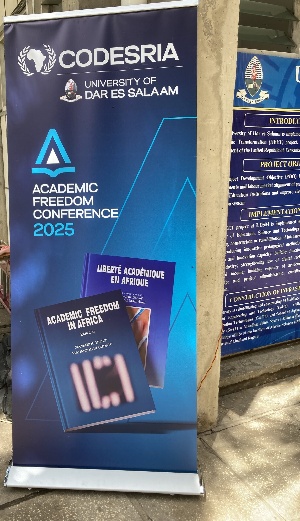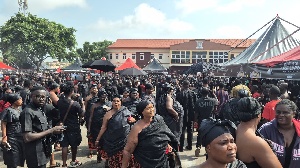Africa News of Thursday, 5 June 2025
Source: www.ghanawebbers.com
Tanzania: Safeguarding Academic Freedom - the Dar es Salaam Annex to the Kampala Declaration
Debating Ideas and Academic Freedom in Africa
Debating Ideas reflects the values of the African Arguments book series. It publishes engaged, often radical scholarship from Africa and beyond. The platform offers debates, contexts, controversies, reviews, and responses related to these books. It is edited by the International African Institute at SOAS University of London.
Academic freedom is increasingly threatened worldwide. Populist regimes and repressive governments contribute to this decline. The recent conflict in Gaza highlights these issues in Global North universities. In countries like the UK, Germany, and the US, some academics face repercussions for opposing atrocities. Unfortunately, Africa's transition to democracy has not protected academic freedom either.
This issue was discussed at an international conference on academic freedom in Africa. The event took place at the University of Dar es Salaam from April 29 to May 2, 2025. Organised by CODESRIA, it attracted over 169 delegates from across the continent.
The conference theme was 'Academic Freedom in Africa: Revisiting the Kampala Declaration.' Participants gathered at a historic university known for past debates on academic freedom. CODESRIA's Executive Secretary highlighted Dar es Salaam's role in promoting this agenda across Africa.
Key Debates on Academic Freedom
Ali Mazrui identified three key elements of academic freedom from an African perspective. He stated that it includes autonomy over curriculum and recruitment processes. Scholars should have freedom to choose research priorities and publish findings. Additionally, there must be general freedom of expression for teachers and students.
Mazrui’s definition emphasizes independent thought and meaningful dialogue within academia. This approach enhances the overall academic landscape.
Advancing academic freedom is crucial for universities' social missions. It allows them to engage with pressing issues like governance and human rights. Safeguarding this freedom is essential for societal development.
In Zambia during the third wave of democracy in the early 1990s, academics played a vital role against political oppression. Their efforts helped restore plural politics after years under Kenneth Kaunda's one-party state.
At the CODESRIA conference, Godwin Murunga stressed scholars' responsibility to connect their struggles with popular movements for justice and dignity. Key themes included education management, gender diversity, university life, knowledge production, and neoliberal impacts on academic freedom.
Challenges Facing Academic Freedom
The conference revealed ongoing threats to academic freedom across public universities in Africa. Papers presented highlighted political capture of university management as a major concern.
Governments often exert control over universities due to funding dependencies. For example, Zambia’s Minister of Education appoints members of university councils directly.
This practice leads to political patronage when appointing top officials like Vice Chancellors or Registrars. Such dynamics suppress both academic freedom and institutional autonomy across many universities.
Academics critical of ruling governments may face severe consequences such as social isolation or diminished career opportunities. This environment fosters self-censorship among scholars regarding sensitive topics like human rights violations or corruption.
The rise of extreme groups also threatens academic freedoms in some countries like South Africa. Pedro Mzileni discussed challenges posed by far-right politics at his university.
Sioux McKenna emphasized that higher education must reclaim its role as a common good while safeguarding its freedoms amid neoliberal pressures.
Funding shortages further exacerbate challenges facing African universities’ research capabilities. Many institutions rely on donor partnerships that can dictate research agendas negatively impacting independence.
Hajer Kratou urged governments to prioritize protecting academic freedoms as essential for peace-building efforts across Africa.
Adoption of the Dar es Salaam Annex (2025)
The conference concluded with adopting the Dar es Salaam Annex (2025) linked to the Kampala Declaration (1990). This document aims to reinvigorate efforts toward safeguarding academic freedoms throughout Africa.
The Annex calls upon intellectuals across Africa for united action against imperialism while advocating for self-determination and dignity among Africans.
It comprises nine chapters focusing on various aspects related to repositioning academic freedoms as collective goods within communities.
Chapters emphasize engaging intellectuals with local struggles while dissociating from harmful ideologies serving elite interests.
Additionally, it addresses funding challenges faced by higher education institutions while encouraging resistance against donor interference.
Delegates stressed reducing reliance on external funding sources through increased local financial resources instead.
The final chapters address discrimination within academia while mandating adherence to previous declarations regarding responsibilities towards safeguarding freedoms.
Concerns were raised about monitoring progress under this new framework without clear definitions regarding rights holders or duty bearers involved.
Despite these concerns surrounding implementation strategies moving forward remains hopeful; collective efforts are needed now more than ever!
Dr Edward Mboyonga specializes in higher education research focused on human development issues globally today!











